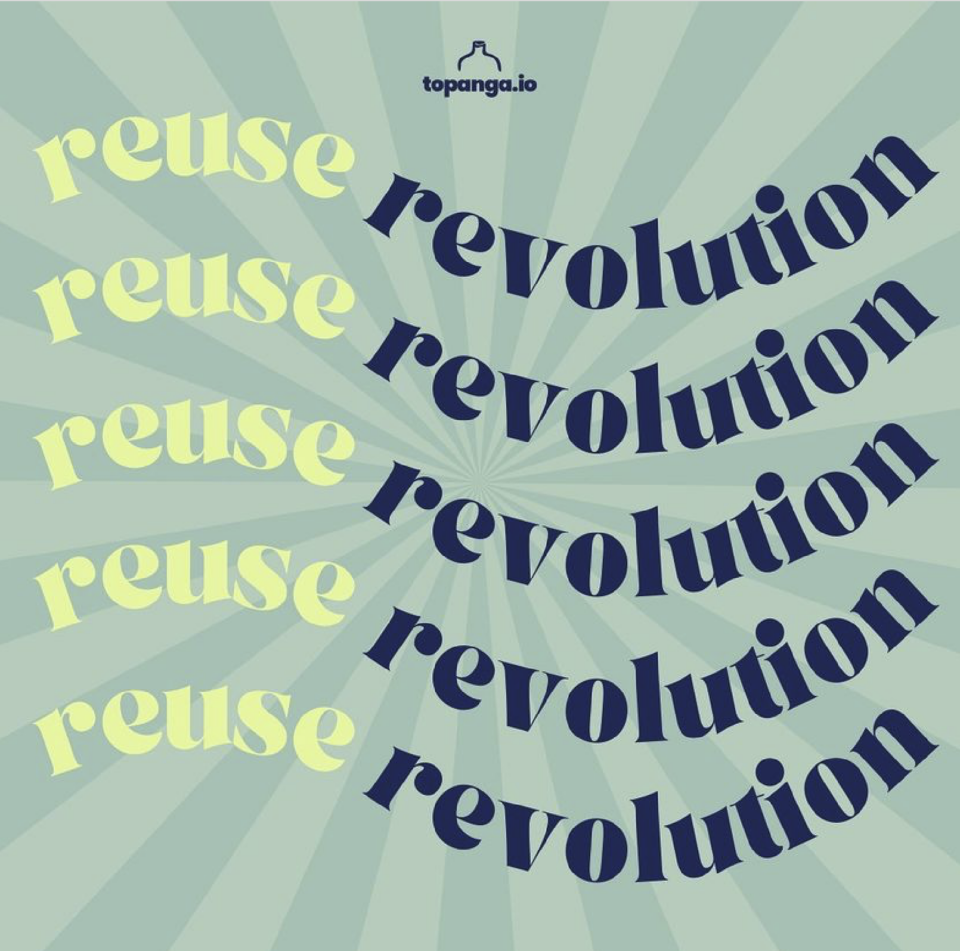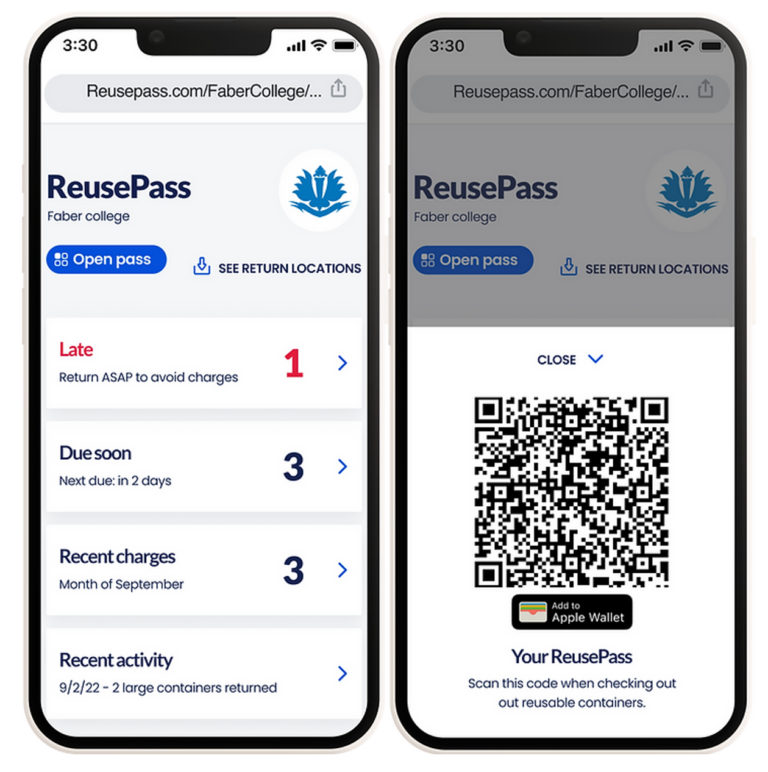Why We Invested: Topanga

We are thrilled to profile Topanga in this edition of our Why We Invested series! Topanga, our most recent investment out of Fund II, is a climate tech platform that enables food service organizations at universities, corporate campuses, and healthcare systems to launch reuse container programs across dining environments. With Topanga’s reuse program, these organizations are best positioned to eliminate single-use packaging (SUP), reduce waste, and avoid greenhouse gas emissions (GHG) by encouraging diners to opt for reusable containers
. . .
Page Schult, CEO and Co-Founder of Topanga, is on a mission to reduce reliance on SUP and ingrain circular behaviors in consumers when it comes to food and drink container usage. While running the e-commerce division at Repurpose, a national sustainable CPG brand, Page recognized a core insight: many consumers are eager to become more sustainable in their day-to-day routines, but frequently they do not have the right tools to implement the behavioral changes needed to accomplish this. With that in mind, Page partnered with fellow Co-Founders Adam Bailey, CTO, and Max Olshansky, Chief Revenue Officer, to build and launch Topanga.
With a $3.6 billion market potential in the U.S. the Topanga team is first focusing on university campuses with the mission to equip students with the necessary tools to embrace sustainability by making simple changes. Their ultimate goal is to deeply instill these eco-friendly habits in students so that they continue practicing them throughout their lives well after graduation. Eventually, they plan to expand beyond higher education and bring reuse programs to other closed dining environments such as corporate and medical campuses.
How does Topanga work in practice on university campuses?
When a university launches Topanga’s reuse program on campus, students/diners and campus food service operators are seamlessly onboarded onto Topanga’s software. For campus food service operators, all reusable packaging and containers are tagged with physical QR codes and RFID technology. These tags allow each reusable container to be tracked throughout its lifecycle, whether it’s on the go with a student or getting washed back at the dining hall, each container can easily be tracked. This RFID tracking technology also allows Topanga to capture inventory data, which gives all stakeholders insight into how many containers are checked out at a given time, the dining locations that containers were checked out from, demographic information on the students that have checked out each container, and importantly real-time economic and climate ROI data.
For students/diners, they simply order their take-out meal ahead or check-out at the point-of-sale with their existing payment options (student card, order ahead app, etc.) and are automatically associated with the container asset with no additional action required. Topanga then automates messaging related to container return dates and incentives through its consumer-facing ReusePass (delivered via mobile-web, no app download is needed), or through SMS. These messages are triggered by Topanga’s highly intelligent communication sequencing technology, which is underpinned by a robust consumer behavior and operator inventory dataset, ensuring strong container return rates and a compelling economic return for campuses.
Once a container is returned to an operator’s existing washing infrastructure, it’s tagged back into the system through Topanga’s proprietary RFID or QR code scanning technology at the point of wash and the container’s “loop” is closed. In turn, universities that implement successful reuse programs can expect to save millions of dollars that would otherwise be spent on single-use, disposable food packaging.
Outside of college campuses, Topanga’s technology can be integrated into similar closed dining environments like corporate campuses and healthcare systems as the core infrastructure of the dining environment is consistent. These food service operators want to reduce their costs related to expensive single-use take-out packaging, while also lowering their environmental footprint from single-use plastic packaging waste – Topanga is an obvious option to help them achieve their goals.
How does Topanga work in practice on university campuses?
Universities are highly motivated to adopt sustainable practices on campus with over 85% of prospective college students expecting their university to prioritize sustainability according to a 2022 Inside Higher Ed study. Despite their efforts to roll out these initiatives on campus, many have failed and reported significant implementation and operational challenges. Previous reuse programs have fallen short due to issues such as poor consumer experience, sanitation concerns, operational complexities, and lack of inventory insight. Most importantly, the return rates for these programs are disappointingly low, often below 20%. In contrast, reuse programs powered by Topanga have achieved remarkable container return rates, averaging 95% and reaching up to 99% across a number of campuses. Until the emergence of Topanga, the reuse space has lacked the innovation and cohesive software infrastructure needed to effectively address the immense opportunity for sustainability. Poor container return rates, the most crucial key performance indicator for any reuse program, have hindered progress.
If containers are not returned, the promise of reuse falls apart, operators quickly lose money and the deleterious environmental effects of SUP persist. Topanga fills this gap by offering a seamless and technology-driven solution that enables organizations to eliminate their dependence on single-use packaging. One of its distinguishing features is being packaging agnostic, allowing operators to maintain existing relationships with packaging suppliers and reduce costs on new packaging purchases. The only modification required is the implementation of QR codes or RFID tags on containers, which is a one-time process. This ease of deployment sets Topanga apart as a clear differentiator for reuse programs.
Topanga’s proprietary scanning technology streamlines the process of checking containers back into the inventory, requiring no intervention from the operator or modifications to washing equipment. This user-friendly experience for operators enhances the ease of implementation and deployment of Topanga’s reuse programs, which is crucial for gaining stakeholder buy-in and securing customer contracts.
Furthermore, Topanga’s software and enterprise API are designed to seamlessly integrate into existing digital workflows. For food service operators, Topanga’s comprehensive container tagging facilitates holistic inventory management, enabling operators to measure the success of their reuse program and assess the economic and environmental return on investment. The implementation process for consumers and cashiers is also smooth. There are no changes to the checkout process, thanks to Topanga’s point-of-sale integration. Operators can quickly scan a QR code or, if the asset is RFID-tagged, diners can simply walk away with their container. This simplicity ensures accountability and adherence, allowing all stakeholders to pursue their reuse objectives without significant changes in behavior.
With Topanga’s innovative approach, universities and similar dining environments can implement successful reuse programs. Through its packaging-agnostic platform, streamlined implementation, and seamless integration into existing workflows, Topanga empowers operators and diners to eliminate their reliance on single-use packaging and achieve sustainable practices while maximizing container return rates and minimizing environmental impact.
Why now?
Struck Capital is thrilled to have co-led Topanga’s $3.6M Seed financing alongside Amasia VC, Wonder Ventures, and strategic climate-focused angels. We believe the gap in the market for a solution like Topanga is only becoming more obvious as the need and desire for sustainability continues to explode. Already, Topanga has seen impressive traction with universities such as Ohio State, Boston University, and many other U.S.-based college campuses, while also building channel partnerships with Grubhub and leading food service providers (e.g., Aramark) that run the dining programs on many university campuses.
We believe the founding team’s distinct advantage in balancing consumer wants and university needs, along with a strong understanding of the selling motion into universities makes them the perfect team to address this massive market opportunity. We are incredibly bullish on Topanga’s ability to transform the way reuse programs effectively scale and eventually banish single-use plastics across campuses, with the goal of ultimately eliminating global greenhouse gas emissions from food provision markets. We look forward to supporting the Topanga team in their mission to enable behavior change and make the world a much more sustainable place!
Check out Topanga‘s website to learn more!
Disclaimer:
The information provided in this blog post is for educational and informational purposes only and is not intended to be investment advice or a recommendation. Struck has no obligation to update, modify, or amend the contents of this blog post nor to notify readers in the event that any information, opinion, forecast or estimate changes or subsequently becomes inaccurate or outdated. In addition, certain information contained herein has been obtained from third party sources and has not been independently verified by Struck. The company featured in this blog post is for illustrative purposes only, has been selected in order to provide an example of the types of investments made by Struck that fit the theme of this blog post and is not representative of all Struck portfolio companies.
Struck Capital Management LLC is registered with the United States Securities and Exchange Commission (“SEC”) as a Registered Investment Adviser (“RIA”). Nothing in this communication should be considered a specific recommendation to buy, sell, or hold a particular security or investment. Past performance of an investment does not guarantee future results. All investments carry risk, including loss of principal.


